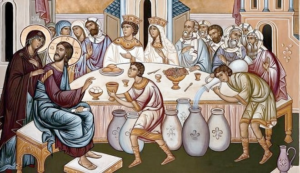A Parent’s Wedding-Day Dilemma
Co-missioners,
Lori Cornell reflects this week on an agony that many other Gospel-trusting parents are facing of late as their children lapse into adulthood. Lori is the long-time editor of the six-step text studies you get from Crossings every week. She makes sure our writers keep probing for the deep God-problem the Scriptures insist that we face and that Christ alone is able to resolve. It’s one thing, of course, to do this from an arm’s-length distance and quite another when the issues are intensely close and personal. We can’t thank Lori enough for taking the risk of sharing these thoughts with us.
Peace and Joy,
The Crossings Community
The Vocation of Getting Out of the Way:
In Six Not-So-Easy Steps
by Lori Cornell

Step 1: Rejoice?
My daughter Elizabeth is about to get married to her beloved. The pall of the pandemic has lifted and residents of our state, Washington, have received the all-clear to have larger gatherings. So the quiet wedding officiated by a justice of the peace, with immediate family only, has turned into a full-blown venue wedding.
I am overjoyed for my daughter.
Step 2: Muzzled Hope
I am a called and ordained Lutheran pastor. When Elizabeth was born and her father and I were preparing for her baptism, we asked our bishop to preside over her baptism. We knew that our calling that day (Reformation Day, by the way) was to be Elizabeth’s parents, entrusting her to Christ in faith. So the bishop asked us to commit to raise our daughter in faith. We wanted her to know the God who searches and knows us in Christ.
Late one night, when Elizabeth was 6, I was doing the tiresome task of wrestling her into submission so she would sleep. I prayed with her and then traced a cross on her forehead saying: “You belong to Christ. You are loved.” I kissed her, and pulled away to turn out the light and insist that she sleep. But Elizabeth gripped my hand, “No Mommy, don’t go.” (I sighed inwardly. Not again.) “Come here, Mommy.” I leaned in. She reached up and traced a cross on my forehead: “You belong to Jesus, Mama. You are loved.” I was humbled.
 In my 27 years of ministry in the Pacific Northwest, I have officiated at more weddings for senior citizens than for Millennials. So I was not surprised to hear that Elizabeth and Taylor prefer to be married at a restaurant overlooking Seattle’s Elliott Bay than in a church sanctuary. Neither is engaged in any kind of faith community. So it will be a pastor-less wedding—except for Mom sitting at the parent table.
In my 27 years of ministry in the Pacific Northwest, I have officiated at more weddings for senior citizens than for Millennials. So I was not surprised to hear that Elizabeth and Taylor prefer to be married at a restaurant overlooking Seattle’s Elliott Bay than in a church sanctuary. Neither is engaged in any kind of faith community. So it will be a pastor-less wedding—except for Mom sitting at the parent table.
I respect my 25-year-old and know that it would be counter-productive to interject my convictions. But as her mother and a preacher of the gospel, I long for her (and Taylor) to reflect on the limits of human love and the boundless love of Christ that carries us in relationship.
Is my silence in the face of her choice faithless? At the very least, my silence about her choice is self-mortifying. Mortifying because I have chosen to preserve my relationship with my daughter over vocalizing my longing to have her hear God’s grace in Christ on her wedding day. Mortifying also because, at this time in her life, she has chosen not to practice her faith. So I wonder, Have I failed her? Has she failed herself? The devil is likely somewhere in these details—always is.
Step 3: Convicted
My silent parental participation in this wedding is at war with my call both as a Christ follower and a pastor. And there is no way for me to win the battle. I’m damned if I speak up and make a scene, and I’m damned if I don’t. It pains me that Christ isn’t on the guest list. And I grieve for Taylor and Liz as I anticipate Christ’s promise going unheard—to be present with them in their joys and their sorrows. And I’m impatient at the idea of depending on the Holy Spirit to get the work of faith done in my child. Especially when God’s track record with Millennials is so imperfect. But then, my track record isn’t much better, I suppose. I say both those things to my damnation.
Step 4: Vessels, Emptied and Full
 In John 2 Jesus attends a wedding with his mother and his disciples. Jesus is not the main event. And he seems fine with that. So, when Mary corners him, insisting that he should remedy the wine shortage, he balks. It’s not his hour to shine. But then, quietly, unceremoniously, he makes sure that the hospitality goes on. Jesus graciously remains in the background but brings joy to the ongoing celebration.
In John 2 Jesus attends a wedding with his mother and his disciples. Jesus is not the main event. And he seems fine with that. So, when Mary corners him, insisting that he should remedy the wine shortage, he balks. It’s not his hour to shine. But then, quietly, unceremoniously, he makes sure that the hospitality goes on. Jesus graciously remains in the background but brings joy to the ongoing celebration.
No one at the wedding—except Jesus—would turn their thoughts to his final hour when he would die in isolation and despair. Raising their full glasses to the bride and groom, no one could anticipate the moment when Jesus would whisper, “I thirst,” and receive sour wine as his only reward.
Yet Jesus did his most important work in that dying moment. Not in the bright light of Cana, but in his darkest hour on the cross. The man who filled the vessels at Cana emptied himself at Calvary to fill us fully with God’s merciful presence.
That self-emptying trust was rewarded when his Father presided over his resurrection. And full of resurrection life, the only thing left empty was the tomb. The pall that hung over him, and us, was lifted. With his resurrection we sample the feast that will come.
Step 5: Filled with Hope
I’ll be thinking about that banquet when I sit at Salty’s at Alki in August—dressed, by the way, in an elegant marine blue chiffon dress with contrasting lavender shawl. And, as I raise a glass to the bride and the groom to bless their marriage, I will celebrate in my heart their love that has its origins in the God who breathed life into the first couple and, more importantly, into his beloved crucified Son.
On her wedding day, I will believe and trust, for my daughter, that the God who keeps showing up when the going gets rough will be present for her at the right and necessary time. And, maybe, in those less ceremonious days, she will be more inclined to look for Christ also.
Step 6: Rejoice!
 Elizabeth and Taylor’s wedding day is only one day. I pray that it will be luminous, with wine that never runs out, and filled with unanticipated joys. For my part, I plan to rejoice in them, savor good wine and great seafood, enjoy the company of beloved friends, and dance my heart out.
Elizabeth and Taylor’s wedding day is only one day. I pray that it will be luminous, with wine that never runs out, and filled with unanticipated joys. For my part, I plan to rejoice in them, savor good wine and great seafood, enjoy the company of beloved friends, and dance my heart out.
But when the celebration is over, I will lift up their love to the God who loves them more, and who gives more than wine at a wedding. I will hold them in the care of a Savior who gave them his life that they may have abundant life—both in their joys and their sorrows.
And, who knows, maybe the day after the wedding I will preach what would have been my wedding sermon to them for my congregation instead—and send them the YouTube link on their first anniversary.